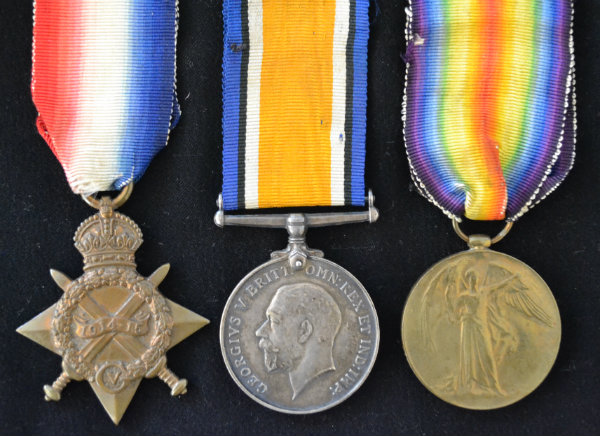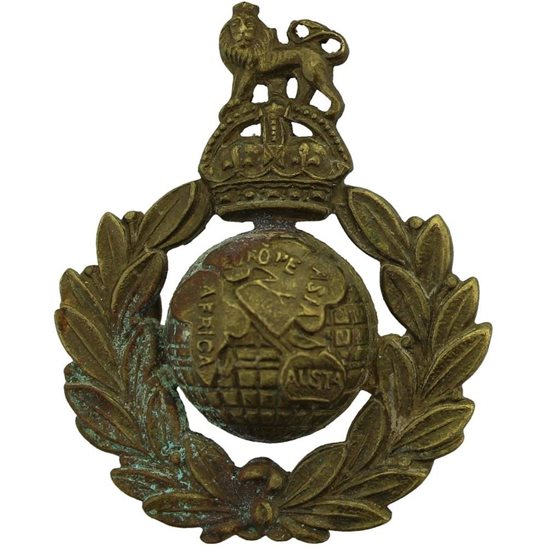Personal Details
Born: 29 July 1895 in Whitchurch, Shropshire.
Family: He was the youngest of six children born to Charles Pennell Kirkby, a master tailor, and his wife Sarah Ann, nee Connerley. He married Hester Catherine Winter on 4 March 1918 at St. Paul`s Parish Church, Newington, London. The couple had four children, Dorothy, Ethel, Hester Edith and Clifford Albert. Dorothy and Ethel were twins born in 1921 and sadly dying in the same year. Hester died in 1938 and Clifford married Hilda Mabel Skinner in 1944 in Westminster, London. No children can be found for this marriage.
Residence: At the time of his birth Clifford`s family were living at 21 Watergate Street, Whitchurch, but by 1901 they had moved to 7 Sherrymill Hill, Whitchurch. In 1911 their address was 9 Yardington, Whitchurch. On his military records an address for his mother, Saran Ann Kirkby, is given as 1 Alkington Road, Whitchurch, however the 1919 Absent Voters List has an address of 1 Cambrian View, Whitchurch for him. In 1939 he was living at 33 Camlan Road, Lewisham, London. At the time of his death he was living at 57 Fieldgate Street, London, E.1.
Employment: On his Attestation in 1912 his occupation was an engine cleaner. In 1939 he was printer bench hand.
Died: 6 January 1955 at Ware Park Hospital, Ware, Hertfordshire, aged 59 and was buried in Hither Green cemetery, Lewisham.
Other Information: On his birth certificate a date of birth of 29 July 1895 is given. However on both his military records and the 1939 Register the date of his birth is given as 29 July 1894.
Military Details
Regiment: Royal Marines
Rank: Private
Service Number: 17627
Date of Enlistment: 30 September 1912
Date of Discharge: 20 January 1922
Reason for Discharge: Discharged Free at own request.
Clifford was awarded the Campaign Medals (1914/15 Star, British War Medal, and Victory Medal)

The 1914 Star (also known as 'Pip') was authorised under Special Army Order no. 350 in November 1917 and by an Admiralty Fleet Order in 1918, for award to officers and men of the British and Indian Expeditionary Forces who served in France or Belgium between 5 August and midnight of 22–23 November 1914. The former date is the day after Britain's declaration of war against the Central Powers, and the closing date marks the end of the First Battle of Ypres.
The 1914–15 Star (also known as 'Pip') was instituted in December 1918 and was awarded to officers and men of British and Imperial forces who served against the Central European Powers in any theatre of the Great War between 5 August 1914 and 31 December 1915. The period of eligibility was prior to the introduction of the Military Service Act 1916, which instituted conscription in Britain.
The British War Medal (also known as 'Squeak') was a silver or bronze medal awarded to officers and men of the British and Imperial Forces who either entered a theatre of war or entered service overseas between 5th August 1914 and 11th November 1918 inclusive. This was later extended to services in Russia, Siberia and some other areas in 1919 and 1920. Approximately 6.5 million British War Medals were issued. Approximately 6.4 million of these were the silver versions of this medal. Around 110,000 of a bronze version were issued mainly to Chinese, Maltese and Indian Labour Corps. The front (obv or obverse) of the medal depicts the head of George V. The recipient's service number, rank, name and unit was impressed on the rim.
The Allied Victory Medal (also known as 'Wilfred') was issued by each of the allies. It was decided that each of the allies should each issue their own bronze victory medal with a similar design, similar equivalent wording and identical ribbon. The British medal was designed by W. McMillan. The front depicts a winged classical figure representing victory. Approximately 5.7 million victory medals were issued. Interestingly, eligibility for this medal was more restrictive and not everyone who received the British War Medal ('Squeak') also received the Victory Medal ('Wilfred'). However, in general, all recipients of 'Wilfred' also received 'Squeak' and all recipients of The 1914 Star or The 1914/1915 Star (also known as 'Pip') also received both 'Squeak' and 'Wilfred'. The recipient's service number, rank, name and unit was impressed on the rim.

